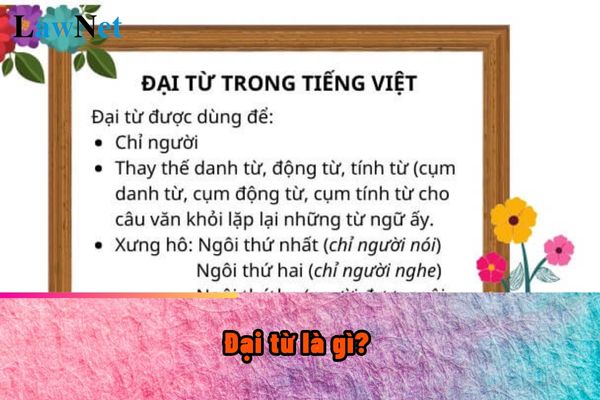What is a pronoun? What is the significance of pronouns in the Vietnamese language? When do students in Vietnam learn about this?
What is a pronoun? What is the significance of pronouns in the Vietnamese language?
- Pronouns are words used to replace nouns, noun phrases, or even sentences to avoid repetition and make the text more coherent and dynamic. Pronouns play an important role in creating coherence between sentences in a paragraph, and between paragraphs.
|
Significance of Pronouns in Vietnamese Language Replacing nouns: |
*Note: The information provided is for reference only./.
>>> See more Overview of cell lesson for Grade 10 Biology according to Canh Dieu curriculum in Vietnam
>>> See more Guidelines on preparing lessons in Grade 10 Math textbook (Volume 1) according to Canh Dieu curriculum in Vietnam
>>> See more Guidelines on the lesson Thanh âm của gió for grade 5 students in Vietnam
>>> See more Guide on the lesson on nouns, verbs, and adjectives for grade 5 students in Vietnam
>>> See more Guide to studying words and sentences (Pronouns) for grade 5 students in Vietnam
>>> See more A brief essay describing a teacher for grade 5 students in Vietnam in the school year 2024-2025

What is a pronoun? What is the significance of pronouns in the Vietnamese language? When do students in Vietnam learn about this? (Image from the Internet)
When do students in Vietnam learn about pronouns?
Based on Section IV of the Appendix of the General Education Program for Literature, issued with Circular 32/2018/TT-BGDDT, the content requirements of Vietnamese language for grade 5 students are as follows:
VIETNAMESE LANGUAGE KNOWLEDGE
- Rules for writing foreign personal and place names
- Some cases of capitalizing common nouns to show special respect
- Vocabulary according to themes
- Dictionary: how to find words, word meanings, and other information retrieval
- Meanings of some common, easy-to-understand idioms
- Meanings of some common Sino-Vietnamese elements, “homophones with different meanings”- Synonyms: characteristics and effects
- Polysemous words and the meanings of polysemous words in texts
- Pronouns and conjunctions: characteristics and functions
- Simple and compound sentences: characteristics and functions
- Usage of the dash (used in sentences to mark explanatory parts) and the hyphen (to connect words)
Thus, according to the above regulations, "pronouns" are taught in the Grade 5 Vietnamese language program.
What are specific capacity requirements to be achieved when teaching Grade 5 Vietnamese to primary students in Vietnam?
Based on subsection 2, Section IV of the Appendix of the General Education Program for Literature, issued with Circular 32/2018/TT-BGDĐT, the specific capacity requirements to be achieved when teaching Grade 5 Vietnamese to primary students are as follows:
- Language competence
Read correctly, fluently, and expressively; understand the main content of the text, primarily explicit content; begin to understand implied content such as themes and moral lessons from the text read.
At the primary level, reading requirements include reading technique and reading comprehension skills.
For students in early grades (Grade 1 and Grade 2), focus on both correct reading with appropriate speed and simple content comprehension.
For students in Grade 3, Grade 4, and Grade 5, emphasize more on specific content comprehension, understanding themes, and extracting moral lessons from the texts.
From Grade 1 to Grade 3, write correctly using orthography, vocabulary, and grammar; write some sentences and short paragraphs; from Grade 4 and Grade 5, initially write complete short essays, mainly narrative, descriptive, and simple introductory essays.
Write narratives of read stories, witnessed events, participated events, and imagined stories; describe familiar objects and phenomena; introduce objects and activities close to students' lives.
Write paragraphs expressing students' feelings and thoughts when reading a story, a poem, or witnessing an emotive event; give opinions on a simple issue in learning and life; write some types of documents such as: autobiographies, messages, invitations, schedules, applications, etc.; initially know how to write following a process; writings need to have three parts (introduction, body, conclusion).
Present ideas and emotions clearly; begin to use appropriate gestures and expressions when speaking; retell stories read or heard clearly; share and exchange feelings, attitudes, and thoughts on discussed issues; explain about a subject or a simple process.
Listen with appropriate attitude and grasp the basic content; recognize the speaker's emotions; know how to respond to what was heard.
- Literature competence
Differentiate between narrative and poetic texts (prose and verse); recognize the content of texts and the writer's attitudes and feelings; initially understand the effects of some formal elements in literary texts (language, characters, plot, rhyme, simile, personification).
Relate, imagine, and express literarily in writing and speaking.
For students in Grade 1 and Grade 2, they must recognize whom or what the text is about; recognize characters in stories and rhymes in poems; recognize stories and poems.
For students in Grade 3, Grade 4, and Grade 5, they must know how to read literary texts expressively; retell or summarize the main content of stories, poems; comment on characters, events, and the writer’s attitudes and feelings in the texts; recognize time and place, types of rhyme, rhythm in poems, beautiful and unique words and images, and the effects of personification and simile.
Understand the meanings or lessons drawn from texts. Write paragraphs and essays narrating and describing with feelings and the ability to associate, imagine.
DOWNLOAD the General Education Program for Literature issued with Circular 32/2018/TT-BGDĐT.

